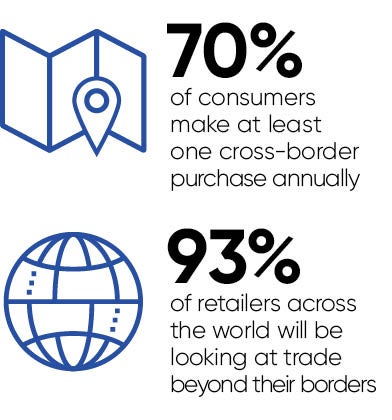The fact is consumers are increasingly comfortable purchasing from companies overseas. Overall, 70 per cent of consumers already make at least one cross-border purchase annually, according to a recent survey, of 12,000 consumers and 1,200 retailers from eight countries, conducted by IDC Research and ORC International.
Chinese and Japanese consumers have an appetite for British brands because of their quality, heritage and uniqueness, while British retailers are looking to expand to the United States, Germany and France within the next 12 months.
“But it’s not as simple as it sounds,” says Michael Griffiths, vice president, global marketing, retail and e-commerce at Pitney Bowes, winners of the 2018 IR1000 award for top solution provider in international e-commerce.
“Getting parcels from point A to point B globally requires know-how built over millions of orders with hundreds of retail partners. Consumers want personalisation created through sophisticated demand generation capabilities and industry-leading support after the purchase.”
We deliver a complete cross-border solution
By next year, 93 per cent of retailers across the world will be looking at trade beyond their borders and retailers indicate that cross-border consumers are more profitable than domestic customers. But that profitability depends on fraud protection, payment processing at scale, compliance and restricted brand optimisation, online marketing, and more. While everyone will say they do these things equally, the revenue generated by Pitney Bowes for cross-border retailers, which can be up to three times higher, tells a different story.
“The choice of partner couldn’t be more important. The attractiveness of the space, especially in the UK, has cross-border startups saying ‘me too’ to everything. Credibility, however, is proven by growth. Pitney Bowes adds more customers in just one quarter than our closest UK competitor has in total,” says Mr Griffiths.
“It’s about asking the right questions. No one wants to be the guinea pig for the partner always telling you what others do wrong, while they have invested in neither the people, scale nor experience to make things right – maybe that’s where the low price comes from?
“We’ve spoken to retailers who lament having to educate high-profile local partners on just the basics of cross-border. Retailers are smart and their time is valuable. They shouldn’t have to be smart on behalf of their cross-border technology partner. The opportunity is too big and the stakes are too high.”
They say you “can’t judge a book by its cover”, but in the world of cross-border e-commerce, you can judge a solution by the additional revenue it generates, risk it reduces and marketplaces it opens.

Attractive markets, including China, Japan and India, are driven predominantly by marketplaces such as T-Mall and Rakutan. There can be no compromises on reaching consumers how, when and where they shop. A solution that doesn’t offer marketplace capabilities severely limits your global reach and forces you to come up with answers on your own. A solution provider who doesn’t address this fundamental strategy doesn’t seem very global or committed to cross-border long term.
“We are inspired by the fantastic brands we work with and how committed they are to their customers. We owe it to them to be about more than words,” says Mr Griffiths. “Our customers deserve a complete cross-border solution. And that’s what we deliver.”
Find out how Pitney Bowes can help you go global please visit www.pitneybowes.com/uk/industry/retail





